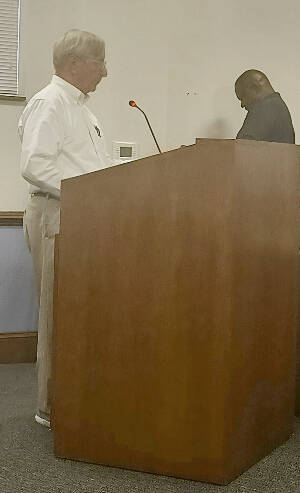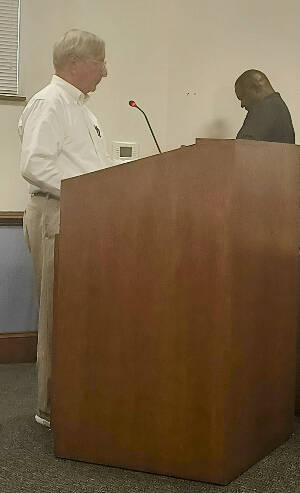WADESBORO — Tax Assessor and Town Planner Larry Newton provided an update on the critiques of his department from the November 15, 2023 peer review conducted by Director of Tax and Revenue Outreach for the Association of County Commissioners David Baker.
Newton informed the board on ongoing and upcoming projects, ranging from late bills, property taxes, vehicle taxes, collections, and updates in county software.
“We have two vacancies in the tax office. One of them has been vacant for some time but over the last 24 to 36 months, we have actually hired three appraisers to fill that one position,” said Newton, while providing an update regarding county staffing.
Quickly tempering this welcome news, Newton adds “Two left for a better offer. The third one that we hired was processed through HR and was scheduled to come to work and had a family medical emergency. We are technically two short, one primary positions.”
No additional funding is needed, Newton said, while acknowledging the peer review completed nearly nine months ago recommended an additional hire, saying “we actually have not advertised for that position at this point. I am going to work with HR to define the job description.”
Another finding of the peer review is that a lack of trained and licensed staff, which caused the county to be in violation of North Carolina’s general statute requiring all county exemptions and present use value (PUV) exemptions be reviewed at least one-eighth of the year. The team’s findings revealed this is not being done due to what Baker believes is a lack of staff, saying back in January when he provided an overview of his findings to commissioners.
“That is required to be done, so the county really needs to try and correct that compliance review program and then start doing that … You are not going to be able to do that unless you add some additional staff,” Baker said
Baker added the team felt an ideal number of staff is eight full time employees, ideally 10 to 12, noting the office currently has six full time employees. When Baker conducted his November 2023 peer review assessment, he uncovered a disturbing pattern within the Anson County Tax Office; all six full-time employees were not trained or certified to carry out their duties as required under North Carolina law.
“It is in the statute, if you are appraising property in North Carolina you have to be certified and all the people on staff here are not. It will help them do their job better and it is also a requirement by law,” Baker said. “The team felt like there is personal property within the county that is not being listed and not being listed correctly.
“Employee training is lacking a little bit and there are requirements in the law for your assessor and your appraiser to be certified and the team found that is not being done right now.”
Baker’s peer review findings revealed the tax office lacked a clear mission statement or vision for the office.
“Things get done but nobody actually documents how to do them,” Baker said.
According to the Nov. 2023 peer review, having cross-trained employees could only benefit staff and customers. Seeking to address this issue, Newton said Anson County must focus on some training in tax collection.
“One of the changes we have made over the last year or two was to look at the front office and to address cross training. From collections to DMV, or DMV to collections, either one of those two offices even back to the tax office, we are already working on a little bit of that cross training. We want to keep that up and have everybody ready to perform,” Newton said.
Moving on to bill printing and mailing, an ongoing issue in the county, Newton announced, the county will begin outsourcing bill printing and mailing this year.
“We will be outsourcing property tax bills, business personal property, which is about 1,400 accounts, and the property tax bills, about 21,000 accounts, and then we will be doing the individual personal property accounts, which is about 4,500. We are not shifting the burden of data entry or any information going into the system,” Newton said.
Newton suggested his office is targeting an early August release date for this year’s tax bills, as opposed to last year’s belated October send-out date.
Discussing collections, Newton said the collections department is fully staffed.
“We have actively now begun to get back into the garnishment program. We are garnishing taxpayers now who are delinquent. There are some things that we can tap to help expedite that, such as we can use major manufacturers in the county to get these names and to get this information so that we can garnish them through their workplace,” Newton said.
He suggested working with companies such as Hornwood, Premiere Fibers, Columbus McKinnon, Southern Fabricators, ect., to get garnishment in place.
“We are still offering payment plans, though payment plans are not as dependable as garnishment or bank attachments, but if we can come into a payment plan with the taxpayer, we can actually get the money quicker, through a payment plan than we can a garnishment because we are capped by how much we can take from a person’s check.”
Though his office is pushing for payment plans, Newton reports that his team has reviewed all the payment plans granted in the past to taxpayers and those who have defaulted on those payment plans, are being notified that they are going to foreclosure. Once the taxpayer enters into a plan with us for payment, the county will not enter into another plan with them again.
Before a foreclosure process were to be initiated against a taxpayer, Newton assures his office will notify the delinquent taxpayer of the situation prior to the start of any kind of foreclosure process. If a taxpayer fails to respond to notification, Newton said, “We will then take the next step to move forward.”
Currently, Newton’s office is working to foreclose on about 25 homes, whose notices date back to two or three years ago. In addition to these foreclosed properties, Newton’s team identified nearly 30 properties, but cannot find the owners of the properties.
An exciting tool in the tax collector’s belt, a bank attachment is a form of collection, allowed under North Carolina law, that is served on an individual’s bank account. Once a delinquent taxpayer’s bank has been notified, the bank is then obligated to place a hold on that individual’s account for 10 days, or until the bank is notified by the tax office that the individual’s debt is paid in full.
A welcome announcement for commissioners, as Baker’s November 2023 findings of a collection rate 2.5 percent lower than Anson’s surrounding counties, caused consternation amongst board members.Speaking in January, Newton told commissioners the county leaves close to $2.5 million in uncollected taxes on the table annually.
Other projects Newton’s office is working to address are “the property tax bills (where) the township was wrong as it was printed on the bill. A bill going into Morven might have had Polkton as the township. It wasn’t violating anything about the content that was on the property tax bill.” He confirmed, “The 2024 tax bills will be correct.”
Newton’s office is also working on a project to split the Lanesboro Fire District.
“That will be complete for the 2024 bills… and when I say complete, I am not going to say ‘totally complete,’ but the fire tax will be billed on the real property side correctly for 2024. The only caveat to that is there is also fire tax charged on vehicles. The state owns the VTS [Vehicle Tax] system, which we operate and they control. They control the management, the updating, and all the integral parts to build these bills, these vehicles in the right place. You know real property doesn’t move around but vehicles do. So, the state is definitely working with us to get that VTS coordinated to the two fire districts,” Newton said.
Newton later added, “I believe, from what information we can pull from the system, we can determine the value so that part of the tax can be distributed like it should be, but we will just do that on the manual side. We don’t even touch the vehicle bills anymore, they come straight from the state to the taxpayer. That will be taken care of just as soon as we can get it done but we won’t have it done when the property tax bills go out, but the property tax will be right. It will just be that the vehicles will have to adjust, so we will take care of that.”



